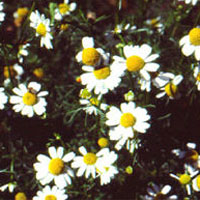health guides
Chamomile
 © Steven Foster
© Steven FosterHow It Works
The flowers of chamomile contain 1–2% volatile oils including alpha-bisabolol, alpha-bisabolol oxides A & B, and matricin (usually converted to chamazulene).1 Other active constituents include the flavonoids apigenin, luteolin, and quercetin. These active ingredients contribute to chamomile’s anti-inflammatory, anti-spasmodic, and smooth-muscle relaxing action, particularly in the gastrointestinal tract.2, 3, 4, 5
Topical applications of chamomile have been shown to be moderately effective in the treatment of eczema.6, 7 One double-blind trial found it to be about 60% as effective as 0.25% hydrocortisone cream.8 Topical use of chamomile ointment was also found to successfully treat mild stasis ulcers and bed sores in elderly bedridden patients.9
How to Use It
Chamomile is often taken three to four times daily between meals10 as a tea. Common alternatives are to use 2–3 grams of the herb in tablet or capsule form or 4–6 ml of tincture three times per day between meals. Standardised extracts containing 1% apigenin and 0.5% volatile oils may also be used. One to two capsules containing 300–400 mg of extract may be taken three times daily. Topical creams or ointments can be applied to the affected area three to four times daily.
Copyright © 2024 TraceGains, Inc. All rights reserved.
Learn more about TraceGains, the company.
The information presented by TraceGains is for informational purposes only. It is based on scientific studies (human, animal, or in vitro), clinical experience, or traditional usage as cited in each article. The results reported may not necessarily occur in all individuals. Self-treatment is not recommended for life-threatening conditions that require medical treatment under a doctor's care. For many of the conditions discussed, treatment with prescription or over the counter medication is also available. Consult your doctor, practitioner, and/or pharmacist for any health problem and before using any supplements or before making any changes in prescribed medications. Information expires December 2024.


 We are proud to announce that
We are proud to announce that  As the market evolves, customers increasingly request a wider variety of omega-3 options for their lipid...
As the market evolves, customers increasingly request a wider variety of omega-3 options for their lipid...  Maintaining healthy glucose levels is crucial for preventing metabolic conditions like diabetes,...
Maintaining healthy glucose levels is crucial for preventing metabolic conditions like diabetes,...  Looking at formulating a new vitamin blend? Discover
Looking at formulating a new vitamin blend? Discover 







































